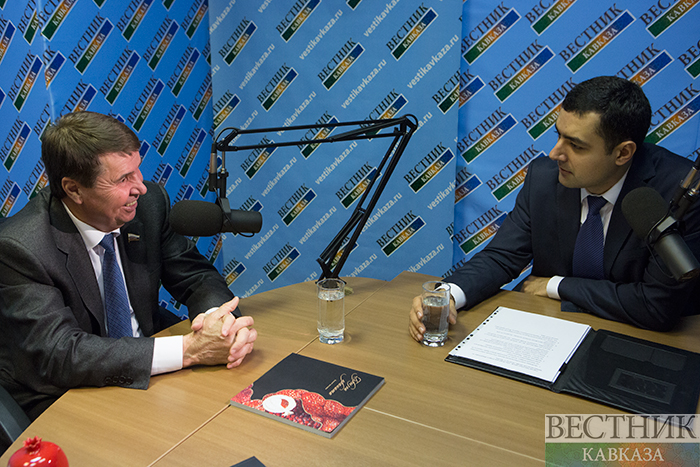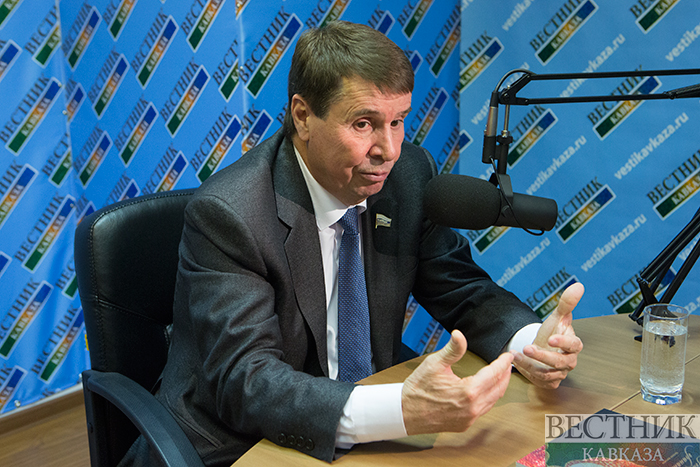On December 31st all residents of Crimea will have electricity supply to their homes. This was promised by the First Deputy Chairman of the Council of Ministers of the Republic, Mikhail Sheremet. “Lights will decorate Christmas trees of all Crimean residents on New Year's Eve. We will fulfill the task no matter what. Everybody will mark New Year in the light,” Sheremet said. Meanwhile, the Minister of Energy of Russia, Alexander Novak, after launching the second line of the energy bridge from Krasnodar Territory to Crimea, said that the peninsula continued getting about 160 MW of electricity power from Ukrainian territory, according to a contract which was signed earlier. The Minister says that the volume of electricity power from Ukraine is no longer critical for Crimea.
Sergey Tsekov, a member of the Federation Council Committee for International Affairs, the senator from Crimea, a guest of the program Tribune, told Vestnik Kavkaza about the problem of energy supply and other issues which were interesting for Crimea’s residents.
- One of the central problems which exists today in Crimea is energy supply. The Prime Minister of Ukraine Arseny Yatsenyuk stated that Ukraine would restore exports of energy to Crimea. What do you think about this initiative? What is the situation in the energy system of Crimea today?
- The situation was quite difficult at the beginning, when the energy supply of Crimea was shut down without any warning. However, day by day and step by step, we are switching on our own generating system. We have fixed almost all the facilities which had not been working for many years, including combined heating and power stations, such as Simferopolskaya and Kamysh-Burunskaya. We involved diesel generators, gas generators. All diesel sets are working well in the united process of energy supplying Crimea. Gasoline generators are also used. We stabilized the situation quickly. I would like to thank the leadership of Crimea and the whole Russian Federation. The energy bridge was involved quickly – a cable across the Kerch Strait.
Ukraine didn’t believe that we would manage to do this quickly. Everybody understands that the break in the electricity supply of Crimea took place according to permission from the top authorities, primarily [President of Ukraine Petro] Poroshenko. They expected that our own generating system would be insufficient to provide Crimea with electricity power.
At the moment we generate 85-90% of our own electricity power. When the second line is ready, the second stage of the energy bridge, we will have 100%.
- Crimea paid the market price for Ukrainian electricity. Why did Ukraine need to cut off the source of stable revenues?
- This is the mentality of the top Ukrainian political officials; they make mistake after mistake. Everything that they try to do against us is actually done against themselves. They forbade food exports to Crimea. As a result, we quickly found new sources of imports in Russia and other countries; while their producers were limited in the realization of their products. They lost the market, even though they could earn good money, as they used to sell food products for higher prices in Crimea than in Ukraine. They punished their own people.
The same story applies to the electricity supply. Electric power came to Ukraine from Russia. And Ukraine bought it from Russia for a lower price, while it sold it to Crimea for a higher price. Moreover, Ukrainian-combined heat and power stations were mainly provided with coal from Russia. In the first 9 months of 2015, Ukrenergo received more than 6 billion rubles from Crimea for electricity supply. 1.5 billion of the 6 billion ended up in the Ukrainian budget. Their net profit was about 500 million rubles. This is money which could be spent on Ukrainian needs.

- Senator Olga Kovitidi directly accused the Crimean Tatar radical group of blowing up the power transmission line poles. She also pointed out its ties with Turkey and the USA. Do you think that the radicals of Crimea have something in common with the case? Is the radical movement strong in Crimea?
- Of course they are involved in the story. The top officials have been letting down the Crimean Tatars not only for the last 20 years, but also for many decades. People often become toys in foreign hands. Radicals were directed to blow up the power transmission pylons. At first they were very proud of what they had done; but when they realized the situation – it is considered to be terrorism – and they remembered that they had relatives, friends, property in Crimea, they began to back down.
The ‘Mejilis of the Crimean Tatar People’, as they called themselves, was an illegal organization in Ukraine as well. The organization wasn’t registered anyway, it wasn’t legalized, it was beyond Russian or Ukrainian legislation. In fact, they have been existing illegally for many years, but also solving many problems, holding various events, employing staff. We asked the Ukrainian authorities in the past: “You understand clearly that people who work in the organization get salaries? But if the organization is not registered, then the organization has no bank account, it pays salaries in black cash. And you don’t mind that, do you?”
Over the years of the Majlis’s existence it was supported by European structures, while the US, Turkey and the Arab countries actively worked with them.
But the problems of the Crimean Tatar people were invented by the elite, which wanted to show its significance. They invent problems to obtain funds, primarily for their own purposes. The shadow of the elite's activities falls on the Crimean Tatar people. But we learned to find a common ground, respect each other's interests, live in peace and harmony and solve common problems a long time ago.
However, now the elite of the Crimean Tatar community is increasingly gaining weight in Crimea – there is a new generation, new leaders who occupy positions of peace, harmony and integration into Russian society. This is great.
- The Crimean Tatar people have never had so many national rights as now...
- They were promised a lot previously, but received nothing. In Ukraine, we have fought together with the sensible part of the Crimean Tatars for many years to have three official languages in Crimea – the Ukrainian, Russian and Crimean Tatar languages. Despite the fact that we have been an autonomy, there was only one state language in Crimea – Ukrainian. But we failed to implement the Ukrainian language into everyday life. We implemented it into paperwork, proceedings, police and prosecutors' work, but in broad terms we failed.

- In January 2015 Crimea and Sevastopol joined the free economic zone. Do you feel an inflow of investment? Do you feel any benefits from this area or are all the benefits blocked by the Western sanctions?
- We are recording the subjects of the free economic zone. Their number is already over a hundred. Russian businessmen who have certain features are recorded, because they know that they would receive significant benefits by working in Crimea.
Now, unfortunately, we are losing investors from Turkey. It was assumed that 500 million dollars would be invested in Crimea from Turkey, but in connection with the position of the Turkish leadership, after our plane was shot down we stopped relations. We hope that the Turkish leadership will understand that a major mistake was made by them.
We lost Turkish investors, but there is interest from China, South Korea, some European companies. Investors who are able to forecast the future do this at a lower cost. There is an interest in Crimea, and the adoption of the relevant legislation on the free economic zone plays an important role in it.
- You as a senator regularly hold meetings with the population. What's bothering Crimean people?
- All social issues were quickly resolved. When we reunited with Russia, we assumed that the transition period would be long. But it has taken only a year or two. Russia quickly resolved major social problems. Pensions have been indexed, and now they are much higher than in Ukraine. The work of healthcare facilities, educational institutions and law enforcement wasn't stopped. The work of our housing and communal services is becoming more and more qualitative. The roads, which hadn't been renovated since Soviet times, kindergartens and schools are being repaired. There are brakes on these issues, but they are not systematic.
My task is mainly legislative, and people address their senator on issues related to the need for changes to the current legislation. For example, in Russia there is the title of Veteran of Labour. When they tried to assign this title to the inhabitants of Crimea, it turned out that it is necessary to be awarded an order or rank of the Russian Federation to get this title. But we have only Ukrainian awards and titles. That is, it is necessary to carry out solutions that would equate Crimean people with other citizens of the Russian Federation in this issue. There are also difficulties in assigning the status of Veteran of the Great Patriotic War. This concept is more extensive in Crimea than in other parts of Russia. But it was said that there will be no cuts to the things which were previously in Crimea. We have the title of Children of War, but Russia doesn't have it. Now we think that perhaps it should be introduced in Russia too.
There are many appeals on obtaining Russian citizenship. It's not an easy problem. Those who lived and were registered in Crimea at the time of the reunification of Crimea with Russia received Russian citizenship without any problems. It was necessary to permanently reside in Crimea on March 18th 2014 to obtain citizenship of the Russian Federation. But there were cases where people permanently resided in Crimea, but were registered in Lugansk, Donetsk or Odessa. More than 50% of complaints are related to this issue. If we could resolve these issues quickly it would be great.
Now I'm trying to convince the Federal Migration Service that we are implementing a very necessary and important program for Russia of voluntary resettlement of Russian compatriots, we spend a lot money abroad and in Russia, and there are Crimean people – citizens of Ukraine. They do not ask for any money or help. Just make them citizens of Russia and they will contribute to both the Crimean and Russian economies. So there are uncomfortable moments in the integration problems of Crimea. We just need time to resolve them, but we will do so.
To be continued






